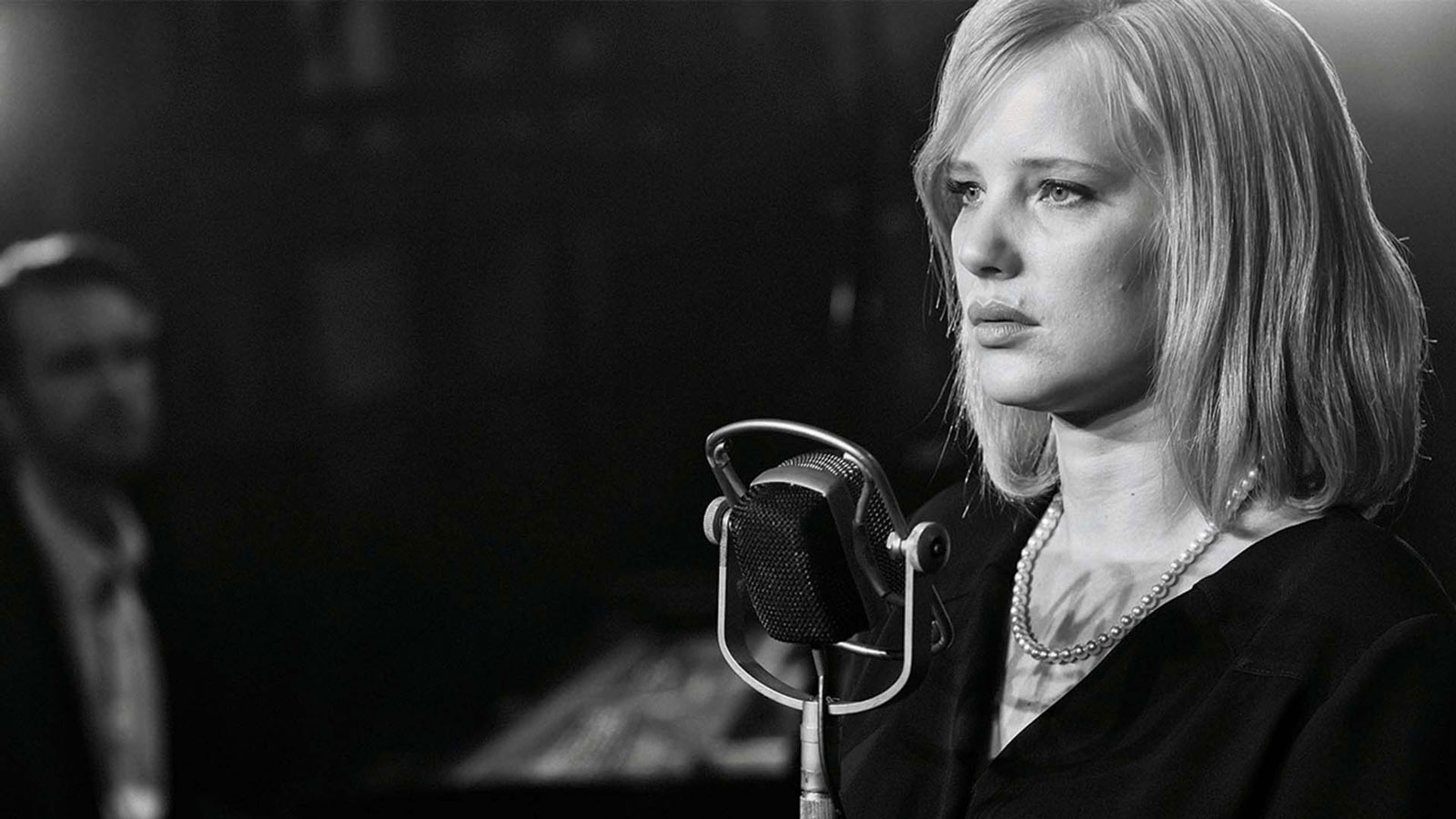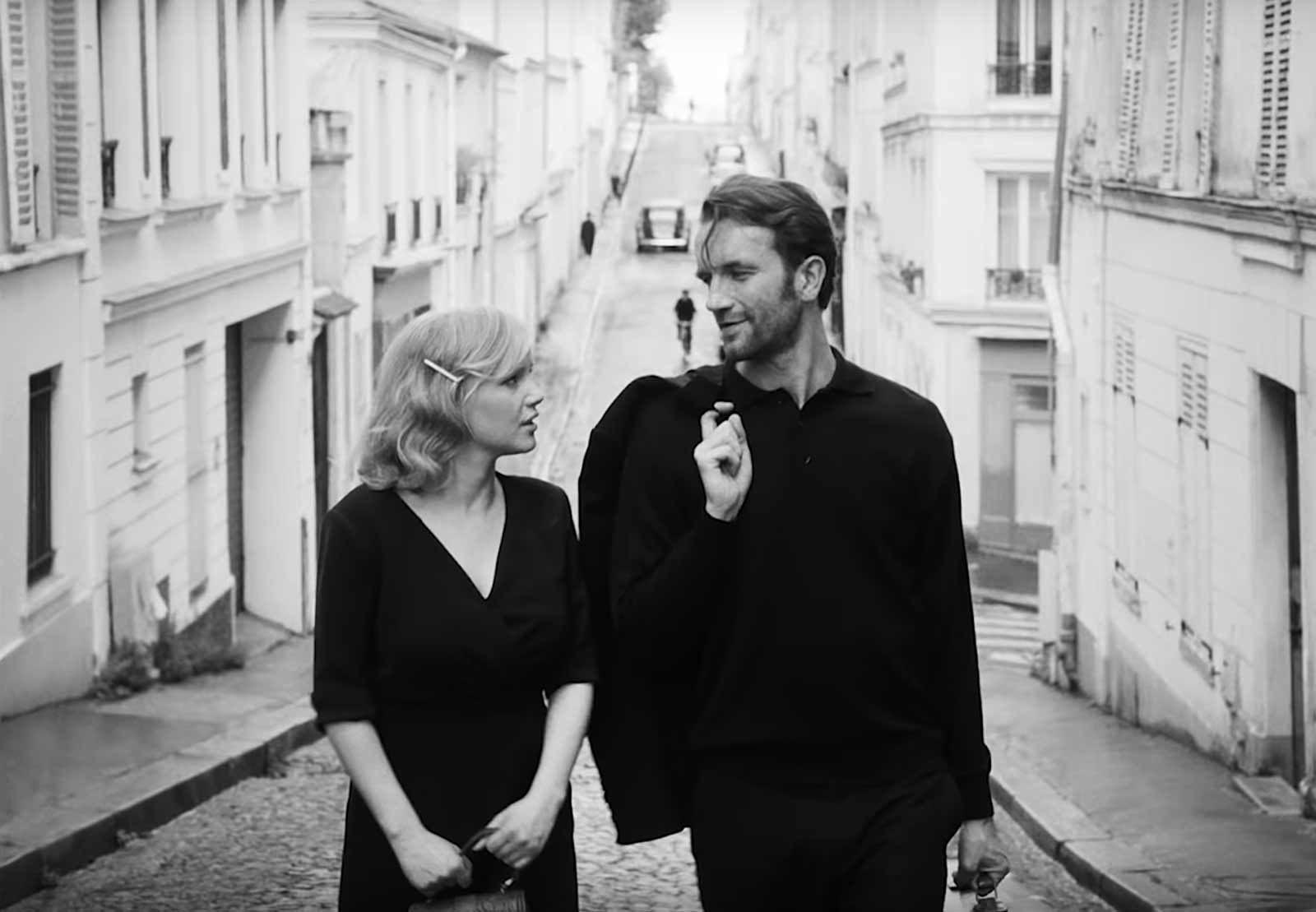The opening scenes of Paweł Pawlikowski’s Cold War offer the most exhilarating film-making I’ve seen in a long while. We are first assailed by the loud discordance of a bagpipe-like instrument. In precise, haunting black and white, we focus on a peasant’s grubby digits, his rheumy eyes; then upon the blunt and awkward faces of the people around him; a violinist’s acne-pitted cheeks; the chickens pecking in their yard. A lone small boy in an overcoat and flapped cap stands listening, sober and perhaps skeptical. These first sounds and images, initially without context, have us, as the wonderful French word has it, dépaysé (displaced or disoriented). And while this film tells a grand love story, it is also a film about nation, art, and belonging, about where, how, and indeed whether, against the backdrop of Europe’s postwar conflicts, artists can find a home.
From the musical barnyard of the first scene, we are transported to another world, a sort of music hall, where a vast peasant woman plays an organ-like instrument, her heavy shoes pumping bellows beneath her voluminous swaying skirts. And transported again, to a simple little girl with braids who sings solo in a humble interior. We gather that a pair, Irena, the woman, older than the man, Wiktor, along with a bureaucrat named Kaczmarek (who drives them, but will prove much more than a driver), are touring the postwar Polish countryside to record folk music for an archive and for the founding of a folk troupe, the Mazurek ensemble, which will perform, and hence revitalize, the music of the Polish people.
In an arresting early scene, their van, as if a toy or cartoon, comes to a stop in the apparent void of a snowscape. Kaczmarek (Borys Szyc) needs to relieve himself, and after first pissing against a tree, he wanders into the ruins of a church. The camera lingers on the damaged frescoes; conveys the soaring walls, now roofless, through which we see the treetops and the vast sky. The moment—the film will return to it much later—is sacred, a moment of pure beauty. It’s not clear whether Kaczmarek (an avid Communist keen to discard religion) appreciates this; but we do. If the utterly compelling brutality of the musicians’ faces recalls the genius of Pasolini, this moment, for all its comparative brevity, evokes Tarkovsky. From the first, watching Cold War we know—with joy and relief—that we’re in the hands of an artist with vision, an artist whose aesthetics will shape and give meaning to his material. The film has a grand story to tell, but it’s as much about the telling as the story itself.
Pawlikowski was, in Cold War, inspired by his own parents’ complicated relationship: the protagonists, Wiktor and Zula, bear their names, and the film is dedicated to them, although it is not strictly biographical. Wiktor (Tomasz Kot) is the musician we meet from the outset, one of the founders of the Mazurek ensemble, for which Zula auditions. Her chutzpah and her mysterious past (she is rumored to have killed her father) intrigue Wiktor, who selects her for the troupe in spite of Irena’s skepticism. Zula is played by Joanna Kulig, the marvelous actress who had a minor part as the magnetic singer in Pawlikowski’s beautifully austere Ida (2013): in this film, too, she sings, gloriously. Kulig is impossible not to watch: like Jeanne Moreau, she has a sexy beauty that is, in rare moments, almost ordinary; those glimpses of plainness only enhance her attractiveness. Ambitious but passive, secretive but on occasion blunt, impetuous yet cowardly, passionate and childish, Zula has a human complexity that is rare in contemporary cinema (and rare in contemporary fiction, too). Next to her, Wiktor seems unexplored, a foil: Kot is a fine actor, but his role is the lesser, that of a man entranced, who loves this woman and his music—and who looks great unshaven, with a cigarette in his mouth.
Once the Mazurek ensemble is launched, Kaczmarek emerges as a scheming apparatchik whose control over the group will grow only ever more draconian—and more cynical. The singers, with increasing success, tour the Communist world singing songs to boost Stalin, rather than playing the strange, unmelodic tunes Irena and Wiktor sought to save from oblivion. Irena quits the group in protest; Wiktor stays on, in order to be near Zula and, we discover, in order to facilitate their defection to the West.
Once the film follows Wiktor to the postwar jazz-world Paris of Sidney Bechet in the Caveau de la Huchette, of dark streets, Seine-side meanderings, dusty garrets, and cafés (to which Zula, for a time at least, will follow him), Cold War becomes considerably less surprising, and deploys a more conventionally glamorous set of images and metaphors. Ah, Paris!, we think, as we have surely thought before: Paris, in black and white, is indeed gorgeous. Events, too, have their filmic parallels. In one scene, Zula recalls Bardot in Godard’s Contempt; in another, Bette Davis in All About Eve; in a third, she has something of Gena Rowlands in a Cassavetes film. There’s a shot that evokes the famous Robert Doisneau photograph The Kiss by the Hôtel de Ville (a poster of which I, like a million other students, had on my dorm room wall). My nineteen-year-old, or even my twenty-seven-year-old, self would have swooned uncritically at these scenes, in thrall to Pawlikowski’s depiction of tortured artists and their intense, destructive allure, beautiful people in beautiful places doing foolish things. I’d expect—and hope—that younger viewers will have this delicious experience. In mid-life, though, I view them with tender nostalgia for my own naïveté. I’ve learned by now that this appealing torment is myth, not truth, and that actual torment looks quite different. I’ve seen the myth often in films before and, even acted out by the charismatic Wiktor and Zula, it can’t affect me quite as once it would have.
Advertisement
Pawlikowski deploys his artistic echoes skillfully—his allusions are deliberate, simultaneously affectionate and ironic—but his recreation, however deft, of an actual and artistic era (mid-century Paris and the films of that Paris) doesn’t rival the visceral power of the earlier Polish scenes. By the time the narrative regains a bleaker East—in which a prison camp is glimpsed, and in which Kaczmarek has become an impresario, with Zula the showpiece of his tacky productions—it seems that the artistic exhilaration of the film’s first twenty minutes cannot be retrieved, and that perhaps this is Pawlikowski’s point. But somehow, Wiktor, Zula, and their creator, find a way out, a return, if you will, to purity; and the film’s conclusion is as beautiful as its opening.
Cold War is, of course, about Wiktor’s and Zula’s drive to find and keep each other, across years and borders; and about the ways in which, in this pursuit, they destroy one another and, for periods, their love. They inevitably take other lovers: Wiktor’s women have barely a line to utter onscreen; but Zula’s suitors include not only Wiktor’s French producer friend Michel (Cédric Kahn), but also the seedy but steely Kaczmarek, whose blandly evil presence evolves, over time, into something less forceful, a puffy small man’s enduring greed for which we feel something almost like tenderness. There’s surely something to be said for the longevity of his commitment to Zula, too: what, one wonders, might their story look like from his perspective?
But Cold War is also about art itself, and the conditions necessary for its creation. Art is always a balance of freedom and constraint, and these two artists find their balance differently: Wiktor needs the freedoms of the West, whereas Zula seems unable to survive them. The film is also about originality and influence—both in its musical movement, from the wild strangeness of Polish folk music to the kitschy renditions Zula will sing, later, at Kaczmarek’s behest, and in Pawlikowski’s thrilling visual conversations with his directorial predecessors: he has made a work of art at once familiar and entirely itself. In spite of minor flaws—or perhaps, like the riveting Joanna Kulig, in part because of them—Cold War is superb: in its performances, its direction, its cinematography. More stylish and less self-conscious than the marvelous Ida, this film is deeply pleasurable to watch, all the more for being so thoughtful and self-knowing. Pawlikowski’s combined seriousness of purpose and playfulness restore faith in the form: What is great art if not serious play?
Paweł Pawlikowski’s Cold War is in theaters.




